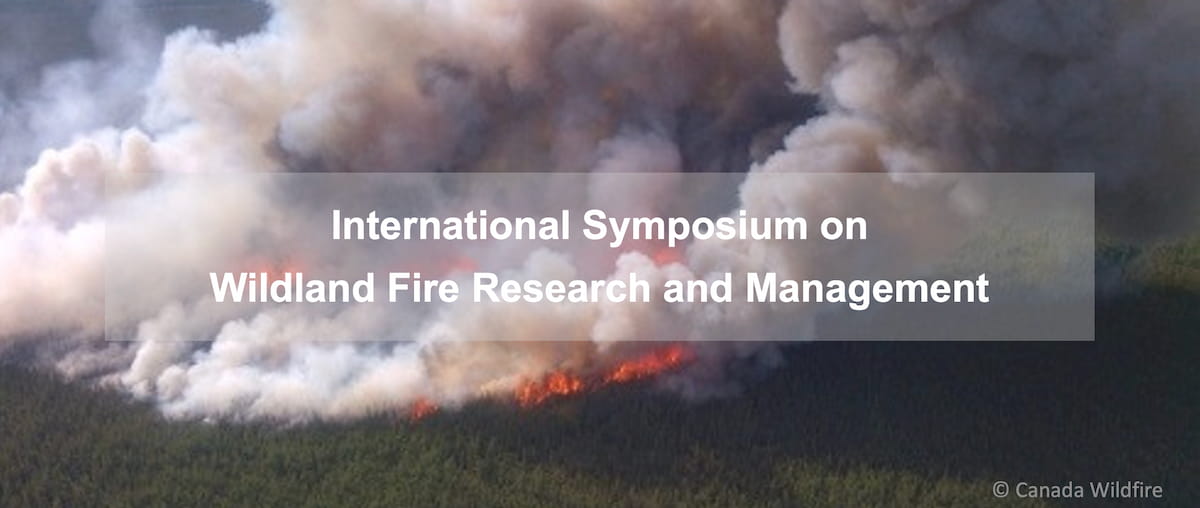
Online Event
In-Person Event
NOTE: Presentation Abstract Submission and Registrations are now closed.
Organizers
Asia Forest Research Centre, The University of British Columbia
College of Forestry, Fujian Agriculture and Forestry University
College of Forestry, Northeast Forestry University,
China National Innovation Alliance of Forest and Grassland Fire Prevention and Control Technology
Co-organizers
Bogor Agricultural University (IPB)
About the Symposium
Wildland fires have significant influences on ecosystem health, economic development, and community safety. Globally, the frequency of extreme wildfires has been increasing, threatening the long-term conservation of ecosystem services and cultural values. The situation is expected to be more severe under changing climate, bringing huge challenges to wildland fire management in general. Better understanding of complicated fire behaviours and the improvement of management capability are essential to maintain readiness for longer, more intense fire seasons in the future.
To continue the meaningful dialogue on fire research and to learn advanced practices in wildland fire management, Asia Forest Research Centre of The University of British Columbia (UBC), Fujian Agriculture and Forestry University, and Northeast Forestry University will organize the International Symposium on Wildland Fire Research and Management on August 9, 2023 (Vancouver time). This symposium will be open to researchers, students, professionals, government officials and non-government members working and/or studying in wildland fires around the world. This symposium aims to advance our collective understanding of fire and its impact on all aspects of human life and natural environment, therefore exploring a better way to co-exist with future wildland fires.
Keynote Speakers
Russell Parsons
Dr. Russell Parsons is a research ecologist with the Fire, Fuels and Smoke research program at the USFS Rocky Mountain Research Station, Fire Sciences Laboratory in Missoula, MT. Russell received his B.S. in Forestry from U.C. Berkeley, in 1992, and then worked several years in fire and resource management with a number of different agencies. After completing his M.S. in Forest Resources at the University of Idaho in 1999, Russell joined the Fire Sciences Lab in 2000 as a remote sensing and GIS analyst, later becoming a research ecologist after completing his PhD in Forestry at the University of Montana in 2007. His research work at the lab spans multiple time and space scales, ranging from landscape fire and vegetation simulation modelling to highly detailed 3D fuel and physics-based fire modelling. Russell develops and uses models to improve our understanding of critical aspects of fire science. A key theme of his current work is to improve our understanding of how fuel treatments alter fire behaviour and the consequences of these changes for firefighter and community safety in fire management.
Xianli Wang
Dr. Xianli Wang is a research scientist working in the Canadian Forest Services, and he is also an adjunct professor in the Department of Renewable Resources at the University of Alberta. Xianli earned a bachelor’s degree in physical geography, and master’s and doctoral degrees in landscape ecology. He then accepted a position as a research scientist working for the Chinese Academy of Sciences. In 2000, Xianli decided to move to North America and has been working in the fields of landscape ecology, fire science, forest ecology, and global change ecology. Currently, Xianli’s research is mainly focused on fire risk, fire simulation modelling, and extreme fire weather and its impacts on fire activities. One of the centers of his research is better understanding and predicting the occurrence and spread of wildfires across large areas. He has developed techniques to evaluate the temporal and spatial variations of fire regimes and fire risks, which enhances the ability of operational fire management agencies to protect human life, socio-economic values, and the environment.
Shuai Yin
Dr. Shuai Yin obtained Ph.D. degree from Hokkaido University and now is working as a research associate at the National Institute of Environmental Studies, Japan. The research of Dr. Yin focused on the satellite monitoring of biomass burning and air pollution, and comprehensively quantifying the related health effect. Based on multi-source remote sensing observations, ground-based monitoring, atmospheric chemical transport models, exposure-response models, etc., he has achieved innovative results from the following aspects. 1) Novel spatial models were developed with satellite observations, which substantially improve the mining capability of spatial data and solve the issue of how effectively integrate and leverage the advantages of multi-source data to serve for climate change mitigation. 2) A multidisciplinary research framework has been established to quantitatively characterize the influence of biomass burning and air pollution and simultaneously predict future risks. 3) Dr. Yin has proposed the climate-corrected model, dynamic assessment mode, etc., which systematically clarifies the interaction mechanism of anthropogenic control, climate change, biomass burning, and air pollution. The above-mentioned academic achievements have been published in well-known journals, e.g., Environment International, Environmental Pollution, Science of the Total Environment, and 14 of these publications are first-authored papers.
Lailan Syaufina
Dr. Lailan Syaufina is a professor in the field of forest protection with forest fire as her major. Her undergraduate from Bogor Agricultural University (IPB), Master’s degree from Georg August University Germany and Ph.D from Universiti Putra Malaysia. Prof. Syaufina has previously served as the Vice Dean for Academic and Student Affairs, Faculty of Forestry and Environment, IPB University (2015-2020). At the national level, she has been a resource person for forest fire and peatland-related policies since 2002. She has been dealing with forest fire research since 1987 and with peatland fire since 1997. She has been involved with the ASEAN Peatland Forest Project as the national expert (2010-2014). Furthermore, she has been involved with several international collaborative research projects: Transboundary Haze with Leed University-UK, Networked ASEAN Peatswamp Forest Community and NET-PEAT with UPM, UTB, and NICT; Collaborative Research on Forestry and Grass Fire Warning and Control Technology and Key Equipment with Fujian Agriculture and Forestry University. She has undertaken several types of research on forest fire in the aspects of fire behaviour, fire impacts, fire causes, fire prevention, early warning system, zero burning, controlled burning, peatland fire, fire-biodiversity, fire-climate, spatio-temporal fire analyses, and fire emission, published in national and international journals.
Kajar Köster
Dr. Kajar Köster is a forest disturbance ecologist, currently working in Department of Environmental and Biological Sciences, University of Eastern Finland (UEF). His research interests include Disturbances (fire, wind, reindeer grazing, insects, etc.) and biogeochemistry, carbon dynamics, greenhouse gas emissions, pyrogenic matter formation and post-fire transport (by water), and post-disturbance changes in biogeochemical processes. His research deals with questions how the northern ecosystems respond to climate change, the changes in land-use, and the changes in disturbance dynamics. Currently, his research focusses on how northern ecosystems respond to changes in fire dynamics and other disturbances, and what are the consequences on the formation of greenhouse gas, volatile organic compound, pyrogenic carbon, and soot emissions. The research uses a wide scope of measurements with extensive field-based measurements including experimental and natural fires and detailed process-level studies on the effects of fires on the formation of particles using the existing laboratories in UEF. The work will link disturbance related studies to plant ecology, biogeochemistry and atmospheric sciences, and will improve predictions of ecosystem responses to a changing climate, and helps to understand possible tipping points in the environment (e.g., transitions of ecosystems from carbon sinks to carbon sources).
Weiwei Wang
Weiwei Wang is a Ph.D. candidate at the Faculty of Forestry, the University of British Columbia (Canada). She obtained her M.Eng. in Forest Remote Sensing at Beijing Normal University in 2019, and her B.S. in Applied Mathematics from the Communication University of China in 2016. Wang has good experiences in mathematical modelling, computer programming, and remote sensing applications. She conducted some previous studies on digital image processing and LiDAR data analyzing in China. Her current research is focused on modeling fire effects and fire-fuel-climate interaction in Canada. The outputs of her studies aim to facilitate better understanding of fire behaviour under changing climate and promote effective fire management especially in protected areas across Canada.
Yong Zhou
Dr. Yong Zhou is an Assistant Professor at Utah State University. Yong earned his B.S. in Ecology from Northeast Normal University in 2010, followed by his M.S. in Ecology from the Institute of Botany, Chinese Academy of Sciences in 2013. In 2018, he received his Ph.D. in Ecosystem Science and Management from Texas A&M University, where his research focused on investigating the influence of woody encroachment into grasslands on landscape-scale soil carbon and nutrient cycles. Following his Ph.D., Yong completed his postdoctoral training at Yale University, where he studied the effects of savanna fires on ecosystem carbon storage. Currently, his research broadly encompasses the impacts of fires on the functioning and services of savanna and grassland ecosystems.






